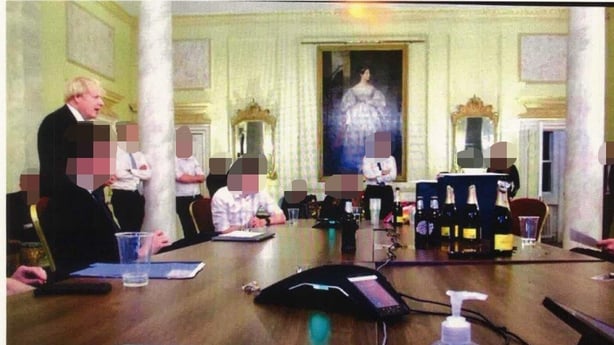Evidence strongly suggests breaches of coronavirus rules would have been "obvious" to former British prime minister Boris Johnson during partygate, the inquiry into whether he lied to MPs has said.
The cross-party Privileges Committee said the Commons may have been misled multiple times as they set up a live showdown with the former prime minister for later this month.
Mr Johnson remarked a mid-pandemic leaving party in No 10 was "probably the most unsocially distanced gathering in the UK right now", according to written evidence.
WhatsApp messages given to the inquiry show advisers "struggling" with how parties were within the rules, with one conceding an excuse "blows another great gaping hole in the PM's account".
Mr Johnson released a statement claiming the inquiry's interim report showed he was being "vindicated" as he raised concern about civil service investigator Sue Gray’s move to British Labour party leader Keir Starmer’s office.
But the committee said: "The evidence strongly suggests that breaches of guidance would have been obvious to Mr Johnson at the time he was at the gatherings.
"There is evidence that those who were advising Mr Johnson about what to say to the press and in the House were themselves struggling to contend that some gatherings were within the rules."
The committee defended its inquiry as being "not based on the Sue Gray report" but on evidence including witnesses, WhatsApps, emails and photographs from a Downing Street photographer.

Evidence included messages between Downing Street’s then-communications director Jack Doyle and a No 10 official discussing the birthday gathering held for Mr Johnson in 2020, for which Mr Johnson was fined by police.
Mr Doyle wrote: "I’m struggling to come up with a way this one is in the rules in my head."
In response to a suggestion that they describe the event as "reasonably necessary for work purposes", he said: "Not sure that one works does it? Also blows another great gaping hole in the PM’s account doesn’t it?'"
One No 10 official in another exchange said a colleague was "worried about leaks of PM having a piss-up and to be fair I don’t think it’s unwarranted".
The committee will cross-examine what Mr Johnson knew, with him making various denials to the Commons, including telling MPs on 8 December 2021 that no rules or guidance had been broken in No 10 when Ms Gray and the police had already concluded that was not correct.
It also pointed to Mr Johnson’s failure to tell the House about his own knowledge of the gatherings where the rules or guidance had been broken.
The report said MPs may also have been misled by Mr Johnson’s assertion that he relied upon repeated assurances that the rules had not been broken.
The committee said: "It appears that Mr Johnson did not correct the statements that he repeatedly made and did not use the well-established procedures of the House to correct something that is wrong at the earliest opportunity."
Mr Johnson may have broken the rules when giving the impression there needed to be an investigation by Ms Gray to establish whether the rules and guidance had been broken.
"While repeatedly making that statement to the House, he appears to have had personal knowledge that he did not reveal," the committee said.
Mr Johnson told the committee he has "no relevant material" after repeated requests for evidence and still "has not provided us with a written submission".
In a public statement released moments after the report was published, Mr Johnson said: "I believe that their labours have helped establish the obvious truth: It is clear from this report that I have not committed any contempt of Parliament.
"It is also clear that what I have been saying about this matter from the beginning has been vindicated.
"That is because there is no evidence in the report that I knowingly or recklessly misled Parliament, or that I failed to update Parliament in a timely manner."
The report makes clear that the publication was "not the final conclusions", with Mr Johnson scheduled to give oral evidence broadcast live on television in the week starting 20 March.
Mr Johnson said he "relied upon advice from officials" so when he told MPs "that the rules and the guidance had been followed, that was my honest belief".
He said it is "surreal" and "particularly concerning" to discover the committee was partially relying on findings from Ms Gray.
The Whitehall enforcer carried out the initial partygate investigation launched by Mr Johnson and will become the Labour leader’s chief of staff.
Mr Johnson said: "I leave it to others to decide how much confidence may now be placed in her inquiry and in the reports that she produced."

